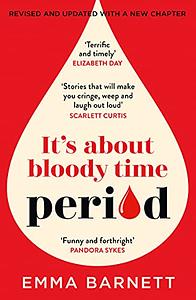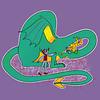Take a photo of a barcode or cover
funny
informative
inspiring
reflective
medium-paced
funny
informative
slow-paced
funny
hopeful
informative
inspiring
reflective
medium-paced
emotional
informative
reflective
sad
fast-paced
I spent the whole book listening to Emma Barnett do her thing and yell about her period in a way that much reflected my own experience (except I've not had the religious issue or a baby or a diagnosis of endo, but I honestly highly suspect it after hearing her talk about her experience), nodding along pretty much the whole way. The intersectional feminist in me was worrying, by the time I was about 4 chapters in, that her focus on periods as a function of womanhood would limit this book in it's scope as trans exclusionary, until Barnett even went there - talking to a non binary trans masc individual about their period, and making me cry talking to a cis woman with no uterus; which could have been given more of a feature, but you have to appreciate that Barnett is writing from her own perspective as a cis woman. Overall, a shouty feminist perspective on an old classic topic that needs this kind of voice, and hopefully does what it sets out to do (I certainly think after the covid-19 situation clears up, I should have some sort of endo investigation in case one day I need to come off the pill, but that's a whole thing I'd need to look at!)
challenging
informative
inspiring
reflective
medium-paced
funny
informative
reflective
medium-paced
The premise of this book is an excellent and important one, periods are too often considered shameful and are not focused on enough in mainstream lifelong education. I was very lucky I went to an all-girls school where the students were very open about periods and period products, and had access to the internet to do our own research. And there was plenty of interesting information and discussion about how people interact with periods, offering some different perspectives and experiences.
But, overall, this book fails to be the powerful, societal shifting text Barnett appears to think she is writing. Instead it gives surface level #girlpower vibes, completely missing the complex intersectionalities of feminism, religion and poverty. I felt Barnett’s voice was far too intrusive, constantly centring herself and her experiences and thoughts rather than making this a hard hitting journalistic piece of sociology. Her attempts to be ‘edgily inclusive’ come off as lacklustre and repetitive, how many times do we need to be told about how a man she spoke to turned ‘period pink’ because of her desire to ‘shock’.
Periods should be talked about more, people’s experiences of them discussed (including the experiences of intersex and trans people, and people of colour). But Barnett’s writing feels like she wants to shock and awe just as much as begin shifting the narrative, making this book a considerable failure.
But, overall, this book fails to be the powerful, societal shifting text Barnett appears to think she is writing. Instead it gives surface level #girlpower vibes, completely missing the complex intersectionalities of feminism, religion and poverty. I felt Barnett’s voice was far too intrusive, constantly centring herself and her experiences and thoughts rather than making this a hard hitting journalistic piece of sociology. Her attempts to be ‘edgily inclusive’ come off as lacklustre and repetitive, how many times do we need to be told about how a man she spoke to turned ‘period pink’ because of her desire to ‘shock’.
Periods should be talked about more, people’s experiences of them discussed (including the experiences of intersex and trans people, and people of colour). But Barnett’s writing feels like she wants to shock and awe just as much as begin shifting the narrative, making this book a considerable failure.
challenging
dark
emotional
funny
informative
inspiring
lighthearted
reflective
fast-paced
informative
reflective






